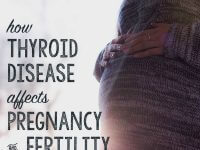

There aren’t many things I can say I’m an expert at in this world. In fact, the short list would include accidentally killing house plants, procrastinating until I have 8 loads of laundry to fold, and cooking dinner one handed while holding a baby.
But there are a couple other things I’m pretty close to expert status at after years of navigating them: pregnancy and thyroid disease. With about 5 combined years of pregnancy and almost that many since my thyroid diagnosis, I’ve learned the hard way how to navigate them both… especially together.
Thyroid Disease + Pregnancy
Pregnancy can be such a wonderful and joyful time, even though it has its struggles.
But there’s another side of pregnancy that can be heartbreaking and devastating…and that is infertility and loss. I recently shared a post about thyroid disease and the autoimmune condition often responsible for causing hypothyroidism, called Hashimoto’s thyroiditis. Not only can it cause debilitating fatigue, anxiety, hair loss, inability to lose weight and so much more — it can also cause infertility and problematic pregnancies.
This is something that the conventional medical community acknowledges, but there don’t seem to be many good resources for pregnant women with thyroid disease. During pregnancy and postpartum, our hormones go through the ringer. This isn’t a bad thing by any means, but because of the overwhelming amounts of hormonal changes, it can trigger an adverse thyroid reaction.
An undiagnosed or not properly managed thyroid problem can also lead to various complications with pregnancy and birth. In fact, untreated thyroid disease increases the chances of premature birth, preeclampsia, miscarriage, low birth weight, anemia and even stillbirth.
Thyroid Problems: What To Look For
It took me years to get properly diagnosed, and I’m incredibly grateful that my children are healthy and my pregnancies were just fine. But, I also wish I’d known the signs and what to ask the doctors to test.
Thyroid disease isn’t something to mess around with, especially before and during pregnancy. Anyone who even suspects thyroid disease should get tested, preferably before pregnancy or as soon as possible. Ask to see the results and make sure the doctor is using the most up to date references. Depending on the doctor’s school of thought, they may be using outdated reference ranges.
5 Lab Tests to Request
Dr. Izabella Wentz, creator of The Thyroid Secret documentary series, recommends these five tests to help pinpoint a potential thyroid problem:
- Thyroid Stimulating Hormone (TSH)— This is the pituitary hormone that measures the level of thyroid hormone in the blood.
- Free T3/Free T4— Will measure the level of active hormones in your blood.
- Reverse T3— This will help determine whether you have hyperthyroidism or hypothyroidism. It tends to be low in hypothyroid cases and high in hyperthyroid cases.
- Thyroid Peroxidase Antibodies/Thyroglobulin Antibodies (TPO/TG Antibodies)— Measures the antibodies and is a great test to spot the condition forming years before it manifests through the TSH test.
- Thyroid Ultrasound— Especially recommended if your doctor suspects abnormal growth or if you have a known thyroid condition.
If any of these labs come back out of the normal range, work with your doctor to establish some best practices to get them back within normal range. Sometimes this might look like medication, and other times, it calls for lifestyle interventions like diet, supplementation, removing toxins from your life, etc.
The Gene Factor
There is a gene mutation known as the MTHFR mutation that can also have a really big impact on pregnancy. A lot of doctor’s are not familiar with the new research on this gene and don’t recognize this mutation as a risk… but it is!
Countless women have this gene mutation and here’s why it’s worth testing. There are now even at-home tests like 23-and-me that test for this mutation.
Folate vs. Folic Acid
One key part of the MTHFR gene mutation is the inability to methylate folate correctly (especially in the synthetic form of folic acid). So as the folic acid comes into the body, it doesn’t get processed and absorbed. Pregnant women need 400 mcg of folic acid per day because it helps prevent birth defects and is essential for baby’s growth. However, if you’re a woman who has this gene mutation, you’re not going to be able to absorb folic acid properly and need to be taking the real version of folic acid called folate.
It’s a real tragedy that babies aren’t getting the right nutrients and suffering the consequences simply because doctors are missing the signs that say these moms need to be on a different form (the real form!) of folic acid. Personally, even before finding out that I had an MTHFR mutation, I chose a prenatal with a natural form of folate… just in case.
Those with this mutation should consider removing folic acid from your diet completely. It is the synthetic version of folate and tends to hide in processed foods and enriched flours. It is better to opt for healthier alternatives like veggies rich in folate and low-glycemic fruits such as blackberries. Going gluten-free is another great way to avoid folic acid. I have great options in my Wellness Mama Cookbook that you and your family might enjoy.
Thyroid Flares During Pregnancy
The most common form of hyperthyroidism in pregnancy is Graves’ disease. In fact, 1 in 1500 women will be affected during their pregnancy. This occurs when there are really high HCg levels in the body.
According to the American Thyroid Association, the most common type of hypothyroidism is caused by the autoimmune disease Hashimoto’s. The ATA states that, “Approximately, 2.5% of women will have a slightly elevated TSH of greater than 6 and 0.4% will have a TSH greater than 10 during pregnancy.”
Both of these conditions can have adverse impacts on both mom and baby, so it’s important to address them. Taking ownership of your health during pregnancy is essential for both of you. If you’re currently struggling with infertility or have suffered from miscarriage(s), take hope that there are proven steps you can begin taking to better your health and improve your chances of conceiving.
Addressing Thyroid Triggers
One big step toward thyroid health is simply addressing triggers that could be causing the thyroid to get out of line.
Leaky Gut
Leaky gut, or intestinal permeability occurs when the body is unable to process food and nutrients the right way. In essence, the gut becomes leaky, and food and other bacteria slip through the cracks triggering digestion and absorption issues. If you’re a science lover like me, you may find this article really helpful for explaining the technicality of intestinal permeability.
Nutrient Deficiencies
This is a big one. Depending on diet, it is easy to be really low in some essential nutrients like iron, magnesium, selenium, and vitamin D. Gut problems can also decrease the body’s ability to process these nutrients effectively. If there’s a problem in the gut, then no matter how much we consume of these supplements or eat nutrient-rich foods, the body won’t be able to snag all the goodness from them. This is especially important to address during pregnancy since there is an increased nutrient demand.
Adrenal Dysfunction
Symptoms like low blood pressure, decreased sex drive, mild depression, and feeling overwhelmed or indecisive, can all stem from adrenal dysfunction. Stress is a huge component to overall wellbeing. The ability or inability to handle stress can directly affect health. Our bodies release cortisol based on our reactions to circumstances and our environment. Our bodies can release too much or too little based on what it thinks it needs. When cortisol dries up, we enter a state of adrenal fatigue. (Source)
Food Sensitivities
Ever feel swollen or bloated after eating? Or get an upset stomach or experience a breakout…all of these symptoms can indicate that your body is sensitive to whatever you just ate. Food sensitivities like gluten, dairy and soy are quite common so try removing them from your diet and get ready for a huge improvement in the way you feel. Gluten can even cause leaky gut so for those trying to heal intestinal permeability, eliminating gluten is a must.
Blood Sugar Imbalance
This one goes hand in hand with supporting the adrenals. When we balance blood sugar, it can decrease anxiety and thyroid antibodies. Dr. Wentz recommends reducing refined carbohydrates and ramping up the good fats and proteins. Proteins and good fats tend to keep you satisfied longer and provide more energy for you to absorb.
Toxicity
A toxic buildup is also common in people struggling with thyroid disease. There are some things like the air we breathe that we can’t control. However, we can take some great strides towards detoxifying our homes. Perhaps it’s time to clean out the old products filled harmful ingredients and switch over to a more natural way of doing things. Check out my “Natural Home” and “Beauty” categories above for natural recipes to replace most household and beauty product.s
Infections
Underlying infections and bacterial overgrowth like Candida are important to address, especially for those who are having trouble conceiving. There are many natural products that can help eradicate gut infections, but I recommend following a well-researched program and working with a trained practitioner. This is especially important for those who are currently pregnant!
Iodine During Pregnancy?
In the functional world of medicine, whether or not you should take iodine is a hot topic. Some people say you need it for proper thyroid function, while others staunchly oppose it. Depending on where you live in the world, you may not need additional supplementation.
During the first 10-12 weeks of gestation, the baby is completely dependent on mama for thyroid hormone. After that, the little one needs iodine in order to produce its own hormone. The World Health Organization recommends 250 µg/d of daily iodine intake, however, in the US, our diets usually provide enough iodine so check with your doctor to see if you need additional supplementation. (Source)
Find a Doctor Who Understands the Thyroid
This probably goes without saying, but finding a doctor who understands thyroid disease and how it affects pregnancy is vital for the conceiving process (for those with infertility) and throughout pregnancy. Look for someone who is knowledgeable about the thyroid and open to lifestyle interventions alongside necessary medications if they’re needed.
If there is one thing I’ve learned in all these years of managing pregnancy and thyroid disease together, it is this:
You are your own advocate, and you are your baby’s advocate. If you suspect something is wrong, be the voice for yourself and your child. Ask questions, do research, and don’t be afraid to stand up for yourself.
More Thyroid Help (For Pregnancy & Conception)
Wading through all the information about the thyroid and pregnancy can feel a little overwhelming. You’re not alone, and I want to share one resource I wish I’d had years ago. This new documentary series called The Thyroid Secret, has information from dozens of the top thyroid experts. It was created by my friend and Hashimoto’s overcomer, Dr. Izabella Wentz. There’s an entire episode dedicated to fertility and the thyroid so whether you’re trying to conceive, currently pregnant or struggling with postpartum thyroiditis; this series will be very helpful.
Dr. Wentz has invited Wellness Mama readers to join her for a free screening beginning March 1st. Reserve a spot here.
Do you or someone you know suffer from infertility or high-risk pregnancies? I’d love to hear your thoughts in the comments!
Continue Reading...How Thyroid Disease Affects Pregnancy and Fertility
from Blog – Wellness Mama® https://wellnessmama.com/156213/pregnancy-thyroid-disease/?utm_source=rss&utm_medium=rss&utm_campaign=pregnancy-thyroid-disease
via SEO Derby
No comments:
Post a Comment